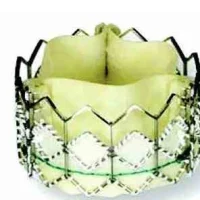According to new data released at EuroPCR 2015, thickening of the valve leaflets following implantation of a transcatheter or surgical aortic valve bioprosthesis is relatively rare and is not linked to short-term clinical events or unique to any one type of valve.
In a special session devoted to this topic, experts recommend that while there is a need for longer-term follow-up and larger studies investigating this issue, there is currently no evidence that supports a change in patient selection, procedural aspects, or post-procedural management for transcatheter aortic valve implantation (TAVI) or surgical aortic valve replacement (SAVR).
More than 100,000 TAVI procedures are performed worldwide and it is now considered standard therapy for high-risk patients and patients with inoperable severe aortic stenosis. However, recent imaging studies in a US-based trial of a TAVI device revealed thickening and reduced mobility of the device leaflet following implantation. This has triggered the discussion about possible adverse clinical effects for the valve recipients.
Researchers presented results from three separate, single-centre studies providing insights from a total of 345 patients treated with a range of transcatheter or surgical valves. In one of the studies, CT and echocardiographic imaging found a spectrum of abnormalities in 7 to 15 percent of patients which included hypo-attenuated leaflet thickening, impaired leaflet motion, and thin films or small aggregations believed to be thrombus. The abnormalities that were observed were not unique to a particular surgical or transcatheter valve. Leaflet abnormalities were not associated with clinical events (stroke, systemic embolism, or valve failure) and most of them resolved with the use of oral anticoagulants. However, the results are based on short-term follow up and patient selection, anticoagulant type, and anticoagulant dose have not been established.
Dr. Raj Makkar, associate director at Cedars Sinai Heart Institute, and author of one of the featured studies points out that no major clinical consequences such as strokes have been observed in the short term but larger and longer terms studies are needed. Dr. Franz-Josef Neumann, Medical Director for the Department of Cardiology and Angiology II, University Heart Center Freiburg, Bad Krozingen, and lead author of one of the studies also reiterates the need for more trials.
Dr. Bernard Prendergast, session co-chair and co-director of PCR London Valves as well as director of the Cardiac Structural Intervention Programme at Guys and St Thomas' Trust in London, UK, commented "TAVI is an established life-saving procedure with a wealth of high quality clinical evidence demonstrating its safety, durability and effectiveness. The reassuring data presented today indicate that there is no need for clinicians to adjust their practice in relation to patient selection, performance of the TAVI procedure, or follow up protocols, including post-procedural imaging and anti-thrombotic therapy."
Source: EuroPCR
Image Credit: Wikimedia Commons










